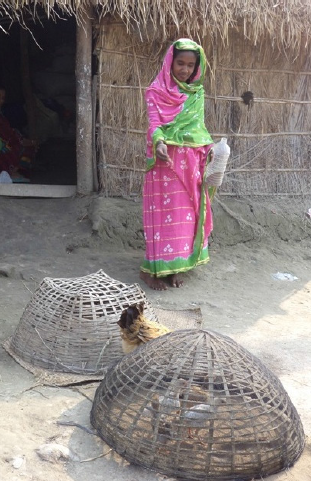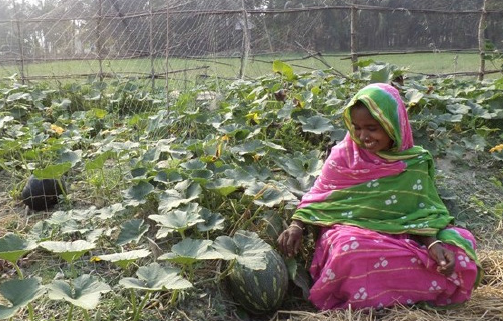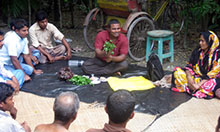
Anowara is an impoverished homemaker living with her husband, Yusuf Ali, and two children in South Sakuchia Village in Manpura, Bhola – one of the most remote islands in the southern region of Bangladesh. Like most rural women in this area, she is illiterate and has limited knowledge of optimal nutrition practices during pregnancy and for her young child.
As a young mother, Anowara faced various difficulties, including the lack of income to provide three meals a day to her children. As a small-scale farmer, her husband was struggling to provide food on a regular basis. “We were really disappointed and felt stressed while dealing with this challenging situation.”
The couple did not understand the importance and impact that key practices could have on health and nutrition, such as exclusive breastfeeding for six months, vitamin intake during pregnancy, and washing hands at critical times (such as before feeding the children). Anowara and Yusuf Ali’s children continued to suffer from bouts of diarrhea, fatigue, and the common cold. The lack of nutritious food and continual sickness placed a large burden on the family, often causing unhappiness, testing emotions, and resulting in quarrels within the family.
Diligence and will can make a life joyful.
- Anowara, homestead farmer of Manpura
SPRING invited her to join a Farmer Nutrition School (FNS) - a group-based learning activity in which homestead food production techniques, along with various nutrition and hygiene messages, are taught to pregnant and lactating women. As a lactating mother, Anowara joined the FNS group in South Sakuchia in October 2013.

By joining an FNS, Anowara received valuable knowledge on hygiene, nutrition, and homestead food production, including techniques to improve vegetable gardening, poultry rearing, and fish culture. These lessons helped change her mindset and led to a positive transformation at home. Using the valuable information Anowara learned through her participation in FNS sessions, particularly on improved horticultural practices, she was able to practice year-round farming and produce many nutritious vegetables for her family. She was amazed to see the increased production, which fully satisfied her family’s daily needs. Utilizing improved technologies, she also started rearing poultry. Using the “hajol,” an innovative hatching pot, and practicing early separation of chicks helped her produce more eggs as well as provide crucial animal protein to the family diet. She was therefore able to provide her children with nutritious food that will help make them healthier.
“It is a great experience for me and my family to cultivate such a huge amount of nutritious food in the simplest way with less effort, which was beyond our imagination,” said Anowara.
